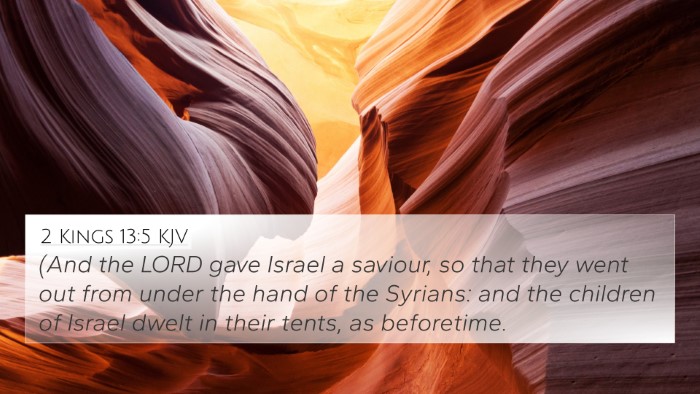Understanding Nehemiah 9:27
Verse: Nehemiah 9:27 (KJV)
"Therefore thou deliveredst them into the hand of their enemies, who vexed them: and in the time of their trouble, when they cried unto thee, thou heardest them from heaven; and according to thy manifold mercies thou gavest them saviours, who saved them out of the hand of their enemies."
Overview
Nehemiah 9:27 presents a critical moment in the history of Israel, emphasizing God's justice, mercy, and the cyclical nature of sin and deliverance within the narrative of the Israelites. This verse illustrates how the Lord responds to the cries of His people in times of distress.
Commentary Insights
- Matthew Henry's Commentary:
Henry notes that this verse underscores the repeated cycle of Israel's rebellion against God and their eventual oppression by enemies. Despite their unfaithfulness, God's enduring mercy shines through as He raises saviors to deliver them. The grace exhibited showcases God as a compassionate figure, always ready to respond to genuine repentance.
- Albert Barnes' Commentary:
Barnes emphasizes the notion of “saviors” in the text, suggesting that this can refer to judges or leaders whom God appointed to rescue Israel. He connects this to the overall theme of God’s covenant loyalty, illustrating that even in their darkest times, God remains faithful to His promises of restoration.
- Adam Clarke's Commentary:
Clarke elaborates on the causes of Israel’s suffering, pointing to their continual disobedience which led to divine discipline. He particularly highlights the phrase "manifold mercies," reflecting the multitude of ways in which God has compassionately intervened to assist His people throughout their history.
Bible Verse Cross References
This verse relates to numerous other scriptures that illustrate similar themes of sin, judgment, and restoration. Below are some key Bible verses that connect with Nehemiah 9:27:
- Judges 2:16-19: Discusses how God raised up judges to save Israel when they cried out due to oppression.
- Psalms 106:43-45: Reflects on Israel's repeated sins and God's repeated mercies in response to their cries for help.
- Isaiah 63:9: Affirms that in all their affliction, God was afflicted and He sent a savior.
- Jeremiah 33:26: Speaks of God's commitment to restore and show mercy to His people.
- 2 Chronicles 14:11: Asa's reliance on God during his time of trouble, illustrating faith amid distress.
- Luke 19:10: Highlights Jesus as a Savior who comes to seek and save the lost, mirroring the saviors of Israel's past.
- Romans 10:13: God promises to hear and respond to those who call upon His name.
Thematic Connections
Nehemiah 9:27 can be analyzed through different Biblical themes, showing how the Old Testament covenants interrelate with New Testament fulfillments:
- The Cycle of Sin and Redemption: This cycle is persistent throughout scripture, connecting the stories of disobedience and deliverance across both Testaments.
- God's Mercy and Faithfulness: The depiction of God's mercy supports understanding His nature, especially regarding His patience and grace towards humanity.
- The Role of Leadership: The necessity of righteous leaders in the community reflects God’s provision of ‘saviors’ in Nehemiah’s context and Christ's ultimate role as Savior.
Research and Study Tools
For those interested in further exploration, several tools can enhance Bible cross-referencing and provide deeper insights into scriptural connections:
- Bible Concordance: Useful for locating specific words and themes in the Bible.
- Cross-reference Bible Study Guides: Help in identifying thematic links across different scriptures.
- Bible reference resources: Offer comprehensive listings of correlated verses and narratives.
Conclusion
Nehemiah 9:27 is more than a simple recount of Israel's history; it stands as a testament to God's enduring love and responsiveness to human suffering. By exploring its connections to other scriptures, believers can gain richer insights into the nature of God as a Savior and the cyclical patterns of grace and redemption found throughout the biblical narrative.
















